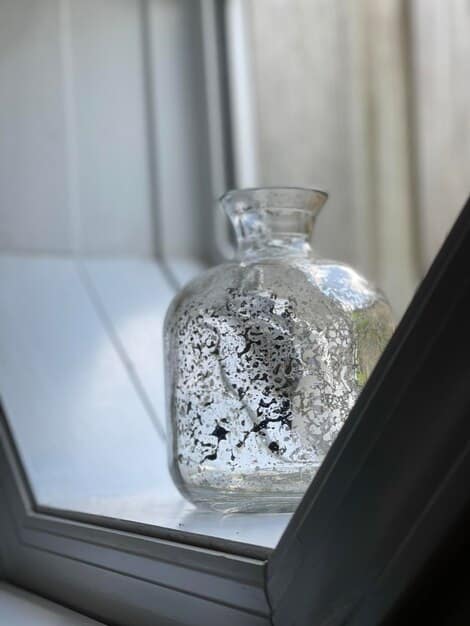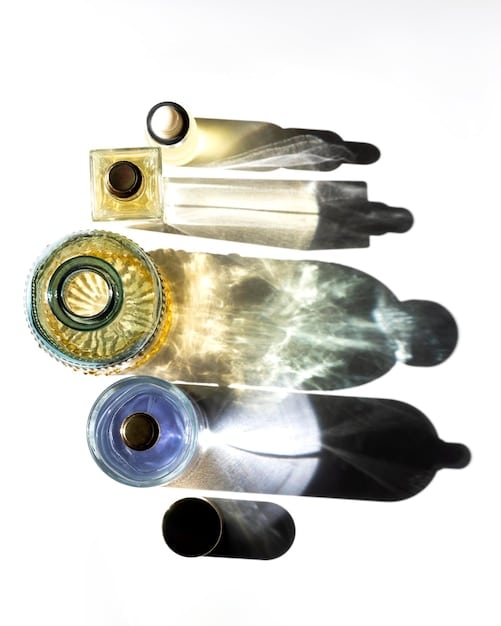The Impact of Climate on Perfume Longevity: A German Perfume Lover’s Guide

Advertisements
The Impact of Climate on Perfume Longevity: A German Perfume Lover’s Guide explores how temperature, humidity, and seasonal changes affect the fragrance experience, offering tailored advice for perfume enthusiasts in Germany to maintain their scent’s integrity and longevity throughout the year.
For perfume aficionados, understanding how environmental factors influence the longevity and character of their cherished fragrances is crucial. In Germany, where seasonal shifts bring a wide range of climatic conditions, knowing the impact of climate on perfume longevity: a German perfume lover’s guide becomes especially important.
Advertisements
Understanding the Basics of Perfume Composition
Each perfume is a complex blend of fragrant oils, aroma compounds, fixatives, and solvents. This intricate composition determines not only the scent profile but also how the fragrance interacts with the environment.
The top, middle, and base notes of a perfume evaporate at different rates, contributing to the fragrance’s evolution over time. External factors like temperature and humidity can influence this process, altering the scent’s character and duration.
Advertisements
The Fragrance Pyramid Explained
The fragrance pyramid is a model used to describe the layers of scents in a perfume. The top notes are the first impression, the middle notes form the heart of the fragrance, and the base notes provide depth and longevity.
Key Ingredients and Their Sensitivity to Climate
Certain ingredients are more susceptible to climatic changes than others. For example, citrus notes tend to dissipate quickly in hot weather, while woody and oriental notes can become overpowering in humid conditions.
- Citrus notes: best suited for summer
- Floral notes: suitable for spring
- Woody notes: suitable for autumn
- Oriental notes: suitable for winter
Understanding these basic concepts is essential for choosing and storing perfumes effectively, particularly in a climate with distinct seasons.
How Temperature Affects Your Perfume
Temperature is a significant factor influencing how perfume behaves on your skin and in the bottle. Heat accelerates the evaporation process, potentially leading to a faster dissipation of the fragrance and an altered scent profile.
In Germany, the stark contrast between warm summers and freezing winters means perfumes react differently depending on the time of year. High temperatures can cause delicate notes to fade rapidly, while colder temperatures may suppress the fragrance’s full potential.

The Impact of Heat on Fragrance Longevity
Heat can break down the chemical bonds in fragrance molecules, causing the scent to degrade and lose its original vibrancy. Storing perfumes in warm environments, such as bathrooms or near windows, can significantly reduce their lifespan.
The Effects of Cold on Scent Profile
While heat can be detrimental, extreme cold can also affect perfume. Low temperatures can cause the fragrance to become muted, preventing the full range of notes from unfolding properly. It’s essential to find a balanced storage solution to preserve the perfume’s integrity.
Maintaining a stable, moderate temperature is crucial for preserving the quality and longevity of your perfume collection, no matter the season.
The Role of Humidity in Fragrance Performance
Humidity, or the amount of moisture in the air, plays a vital role in how perfume interacts with your skin. High humidity levels can intensify certain fragrance notes, making them feel heavier and more pronounced.
In Germany, humidity levels vary throughout the year, from the damp days of autumn to the relatively dry air of winter. This variation means that perfumes will smell different depending on the season, requiring careful consideration of fragrance choices.
How Humidity Intensifies Scents
When the air is humid, the moisture can trap fragrance molecules, causing them to linger longer on your skin. This effect can amplify the scent, making it more noticeable and potentially overwhelming.
Adjusting Your Fragrance Choices for Humid Weather
In humid conditions, lighter, fresher scents tend to perform best. Citrus, aquatic, and green notes can provide a refreshing and uplifting experience without becoming too heavy or cloying. Avoiding heavy, oriental, or overly sweet fragrances can prevent the scent from becoming overwhelming.
- Opt for lighter, fresher scents
- Avoid heavy oriental or sweet fragrances
- Consider aquatic or green notes
Understanding how humidity affects fragrance performance can help you make informed choices and ensure that your perfume remains enjoyable, regardless of the weather.
Seasonal Changes and Perfume Selection in Germany
Germany experiences distinct seasonal changes, each bringing its own set of climatic conditions. Adapting your perfume selection to match these seasonal shifts is essential for maximizing fragrance enjoyment.
From the blooming flowers of spring to the crisp air of autumn, each season evokes different moods and calls for different fragrance profiles. Choosing perfumes that complement the weather and atmosphere can enhance your overall sensory experience.

Spring: Light and Floral Fragrances
Spring in Germany is a time of renewal and blossoming flowers. Light, floral fragrances with notes of lily of the valley, rose, and jasmine are perfect for capturing the essence of the season.
Summer: Fresh and Aquatic Scents
Summer calls for fresh, aquatic scents that evoke the feeling of cool breezes and clear waters. Citrus, marine, and green notes can provide a refreshing and invigorating experience.
Autumn: Warm and Spicy Perfumes
As the leaves change color and the air turns crisp, warm and spicy perfumes come into their own. Notes of cinnamon, clove, and amber create a cozy and comforting atmosphere.
Winter: Rich and Woody Fragrances
Winter is the time for rich, woody fragrances that offer warmth and depth. Oriental, amber, and vanilla notes can provide a comforting and luxurious experience during the colder months.
By aligning your perfume choices with the seasons, you can create a harmonious and immersive sensory experience that complements the unique atmosphere of each time of year.
Proper Perfume Storage to Combat Climate Effects
Proper perfume storage is essential to protect your fragrances from the damaging effects of climate. Exposure to heat, light, and humidity can degrade the quality of the perfume, altering its scent and reducing its longevity.
Implementing effective storage practices can help preserve the integrity of your perfume collection, ensuring that each fragrance remains as beautiful and captivating as the day you bought it.
Ideal Storage Conditions: Temperature, Light, and Humidity
The ideal storage conditions for perfume include a cool, dark, and dry environment. Avoid storing perfumes in bathrooms, near windows, or in direct sunlight, as these conditions can accelerate degradation.
Best Practices for Preserving Fragrance Quality
Store perfumes in their original boxes or in a closed cabinet to protect them from light. Keep them away from sources of heat, such as radiators or heaters. Consider using a perfume fridge for ultimate preservation.
- Store in a cool, dark, and dry place
- Keep perfumes in their original boxes
- Avoid exposure to direct sunlight and heat
By following these simple storage guidelines, you can extend the life of your perfumes and ensure that they retain their original scent for years to come.
Choosing Perfumes for Different Climates: A Practical Guide
Selecting the right perfume for different climates involves considering factors such as temperature, humidity, and seasonal changes. Understanding how these elements affect fragrance performance can help you make informed choices and enhance your overall olfactory experience.
A practical guide can provide valuable insights into selecting perfumes that complement specific climatic conditions, ensuring that your fragrance remains enjoyable and appropriate, regardless of the weather.
Perfumes for Hot and Humid Climates
In hot and humid climates, opt for lighter, fresher scents that won’t become overwhelming. Citrus, aquatic, and green notes are excellent choices, providing a refreshing and invigorating experience.
Perfumes for Cold and Dry Climates
In cold and dry climates, richer, warmer fragrances tend to perform best. Oriental, woody, and amber notes can provide a comforting and luxurious experience, enveloping you in warmth.
Choosing perfumes that complement the climate ensures that your fragrance harmonizes with the environment, enhancing your personal style and leaving a lasting impression.
| Key Point | Brief Description |
|---|---|
| 🌡️ Temperature | High temperatures can degrade perfume; store in a cool place. |
| 💧 Humidity | High humidity intensifies scents; use lighter fragrances. |
| ☀️ Sunlight | Sunlight can damage perfumes; store them in a dark place. |
| 🌸 Season | Match perfume to the season: floral for spring, woody for winter. |
Frequently Asked Questions
▼
Climate significantly alters how perfumes smell and perform. Heat can make fragrances dissipate faster, while humidity can intensify certain notes, creating a different olfactory experience.
▼
In Germany, store perfumes in a cool, dark, and dry place, away from direct sunlight and temperature fluctuations. A closed cabinet or the original boxes are ideal for protection.
▼
In hot weather, base notes like sandalwood, vetiver, and patchouli tend to last longer compared to lighter citrus or floral notes, which can evaporate quickly with heat.
▼
To make perfume last longer in winter, apply it to moisturized skin. The moisture helps to trap the fragrance molecules, enhancing longevity in the dry winter air.
▼
Yes, adjusting perfume application based on the season is advisable. Use a lighter hand in summer to avoid overwhelming scents, and apply more generously in winter when scents tend to fade faster.
Conclusion
Understanding the impact of climate on perfume longevity is crucial for German perfume lovers to ensure their fragrances perform optimally throughout the year. By considering factors like temperature, humidity, and seasonal changes, and following proper storage practices, you can preserve the integrity of your perfumes and enhance your overall fragrance experience.